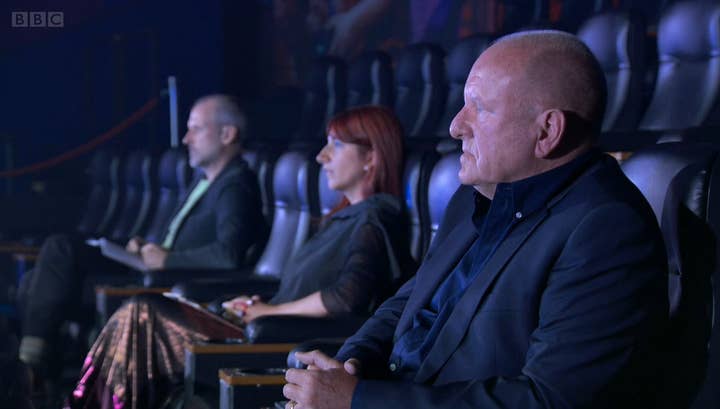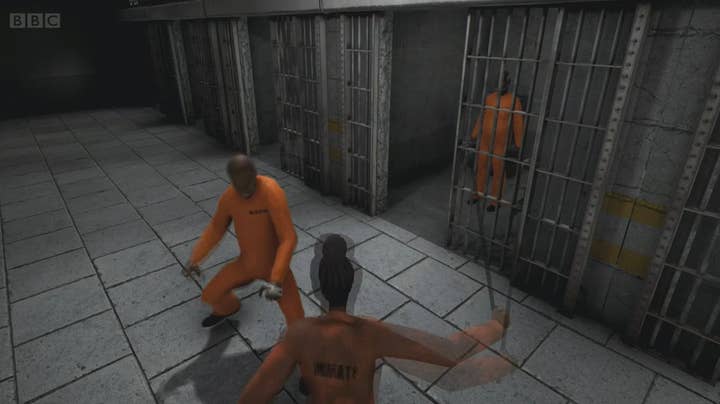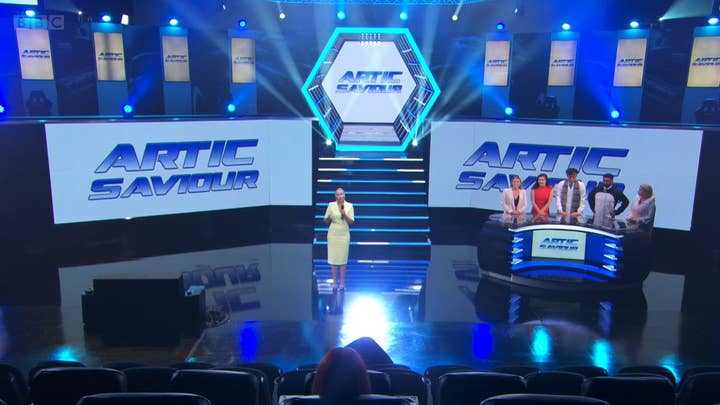What developers can learn from last night's The Apprentice
Industry veterans Ian Livingstone and Roberta Lucca offer further advice after judging this week's episode
The UK version of The Apprentice aired its latest episode last night, challenging the candidate with something very much in the wheelhouse of GamesIndustry.biz readers: making video games.
Split into two teams, the eleven contestants had to come up with a game concept, which was then developed into a playable demo. The teams also had to create their own branding and a promotional video.
After getting feedback from a playtesting event held in Central London, with selected consumers trying out the games for themselves, the teams had to then pitch their games to real investors:
- Ian Livingstone, industry veteran and the UK games business' first ever knight
- Roberta Lucca, co-founder of Surgeon Simulator developer Bossa Studios
- Mark Morris, who worked at Microsoft and helped launched the Xbox One
No pressure, then.

The investor Q&A makes up less than five minutes of the hour-long episode, but nevertheless there are lessons to be learned from their reactions to the contestants' pitches. The GamesIndustry.biz Academy also reached out to Livingstone and Lucca for additional advice for any developers preparing to make similar presentations.
First, let's take a look at the games.
Time
The first team pitched a 3D stealth action adventure that put players in the orange prison jumpsuit of Emilia Stone, an FBI agent who had been framed for leaking secrets and is trying to escape.
The game was called Time, due to her 'doing time' and the fact there is a time limit to clear each floor by finding keys, subduing guards and other prisoners, and collecting information on the mysterious person helping her escape.

The team positioned Stone as a "strong female protagonist," to which Lucca's first question was: "If she's dressed the same way as everyone else in the game, does that make her stand out?" Something to bear in mind when designing your character.
"As an investor, you pay attention to the details"
Ian Livingstone
The concept for the broader game is that each level will be a floor of the prison. Morris recognised this could get repetitive and asked why players would want to play this over and over again -- emphasising that developers should consider why their game has replayability and will retain players.
In the boardroom scene at the end, it was revealed the investors liked the character of Emilia Stone and said they would have invested £20,000 each, a total of £60,000, for further development.
Artic Saviour
The second team wanted a game that tackled a topical issue: climate change. Aimed at players of all ages, although leaning towards children, this is a 2D platformer where the player (as Sam The Scientist) rescues animals, including polar bears, walruses and penguins, and shoots enemies.
Due to an unfortunate misspelling of 'arctic,' the game was called Artic Saviour. After debating back and forth as to whether or not to address this during the pitch, they opted to keep quiet about it.
Ian Livingstone's first question was how you spell 'arctic.'

The team confessed it was a typo and emphasised that if this were a real game, they would of course spell the name correctly, to which Livingstone replied: "As an investor, you pay attention to the details."
Speaking of which, Ian's next question (directed to the member of the team wearing a penguin onesie) was: "Mr Penguin, how many penguins are there in the Arctic?"
"There's no point in you making your boat pristine if there's no wind to take you anywhere. The wind is the market"
Roberta Lucca, Bossa Studios
To save you from firing up Google, there are none. They are in Antarctica. We're in danger of labouring the point, but it's a crucial one: details matter.
Morris also commented on the team's pitch, warning that this environmentally-minded 2D platformer would be "going up against monsters in the entertainment space" (a certain Italian plumber comes to mind).
In the boardroom, it was revealed the investors believed the game concept to be too simple and none opted to invest in the project.
As mentioned, we reached out to both Livingstone and Lucca for further advice around the pitching process, and here's what they had to say.
Ian Livingstone's top ten tips for developers
- Do not be afraid of failure. Failure is success work-in-progress. Take your learnings and iterate.
- Retain ownership of your intellectual property to build value in your company. Try not to trade it away for project finance.
- Do what you are good at and partner with somebody to do the jobs you don't want to do or can't do.
- Ideas are cheap. It's the execution of the idea that is hard.
- Making money should not be the initial motivating factor. Money should be a bi-product of doing what you enjoy.
- Know your market and know how to reach it.
- Make yourself investor-ready before asking for investor funding.
- Have 'skin in the game' before asking others to invest.
- Understand the business and business models of video games.
- Data, data, data
Roberta Lucca's four steps to winning over investors

1. Think about the market
When choosing the theme and gameplay, bear in mind what's on the market and what has been successful in the past. It's like sailing. There's no point in you making your boat pristine if there's no wind to take you anywhere. The wind is the market. Those can give you a great indication of what resonates (or not!) with gamers. Then take aspects of gameplay/theme familiarity and add your uniqueness to it, but bear in mind what types of gamers you are creating this game for and for which platform.
2. Learn how to pitch
If you are in need of a publisher or an investor, learning how to properly pitch your game or business is fundamental. It's not enough to have a prototype -- you must know to passionately and convincingly articulate your idea. Why are you the one who will make this game huge? As an angel investor, I want to see their vision for not only the game but their business.
3. Create a character to connect with
Strong and diverse characters are much more important than people think. People connect with people and stories. Make characters that resonate with human emotions. Be it for a laugh, for a cry, fear. I think the team who made Time actually nailed that.
4. Attention to detail
Like all forms of art and tech, if you as the developer don't pay attention to every single detail of what you are making -- the title, the artwork, the story, the setting, the player's progression, why players will come back to play your game every day -- your big vision will fall apart. We saw that with Artic Saviour.

